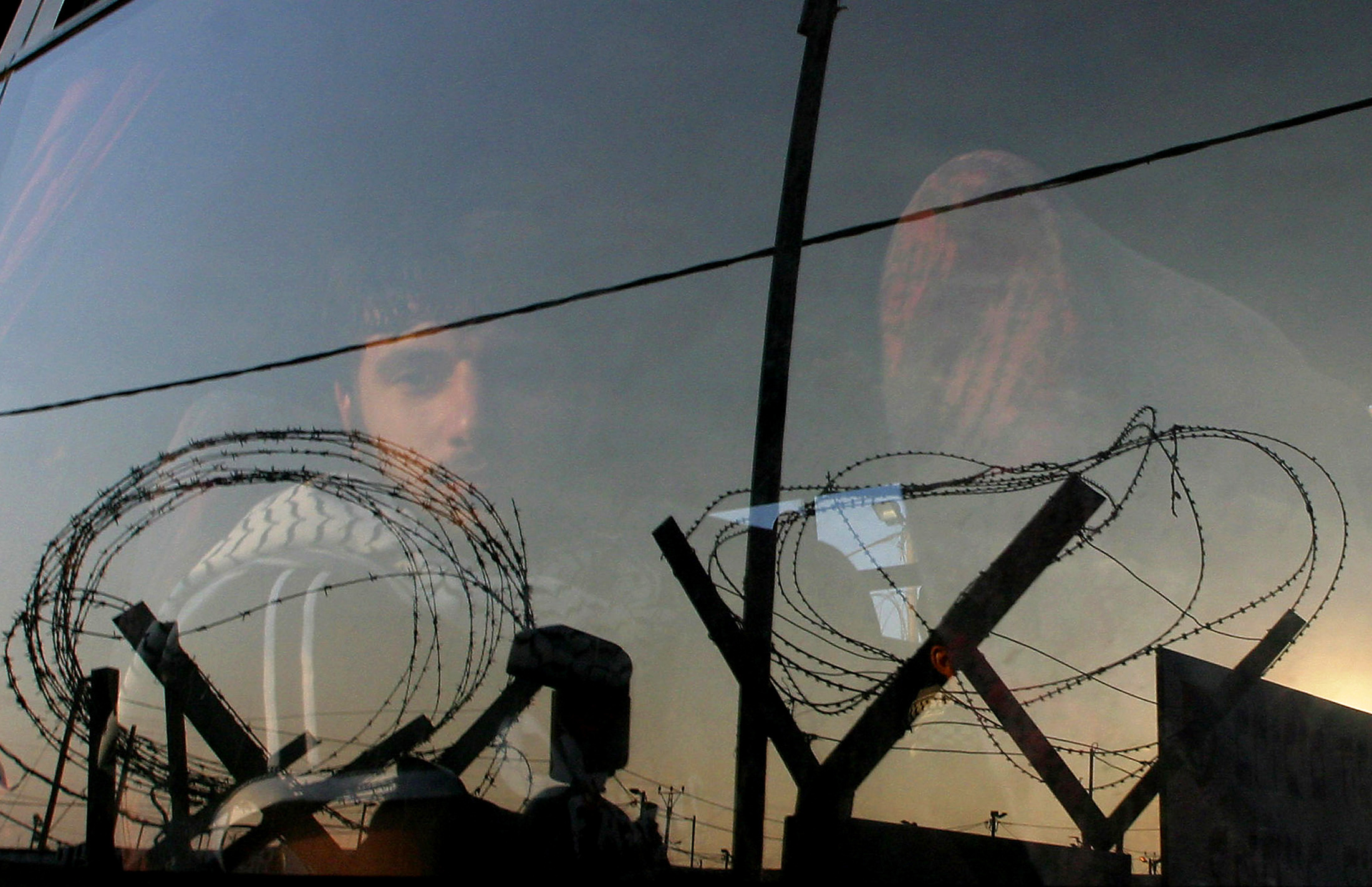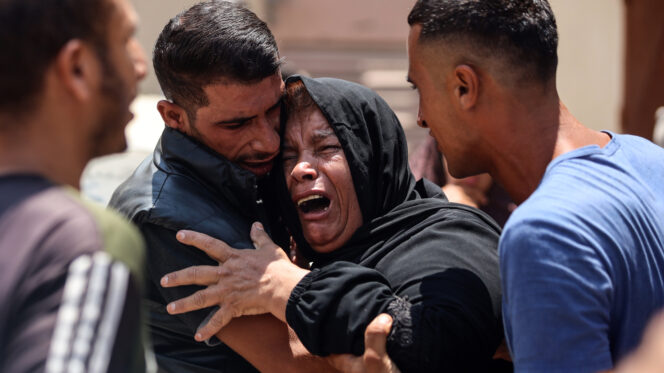Israel Sent Me to the Same Prison Where It Tortured My Palestinian Brother
Israel stole his childhood.
by Kieran Andrieu
13 October 2025

We all lead vicarious lives, and experts of the mind have numerous theories as to why we do. Some cases are clearer cut than others: nobody needs to ask why a person debilitated by illness or old age dwells on the imagined life of a younger, healthier counterpart; nor why a prisoner fixates on the freedom of the person in the street.
My younger brother, Ahmed, was first imprisoned by the state of Israel when he was 12 years old, and I have often wondered whether he thinks of me as often as I do of him. Whether he regularly imagines what I might be doing with my infinitely freer and safer existence. Whether the conclusion of those reveries is an escape from his own traumatic reality or, as I tend to fear, a bitter resentment that two quirks of time and geopolitics mean we are in our respective places.
Ahmed was first kidnapped and locked up by Israel sometime after the second intifada in 2000. Disgusted at the bulldozing of a neighbouring Palestinian village, he and some friends fashioned slingshots, gathered rocks and faced down the tanks. I was born two years before my brother, in a cosy town on the south coast of England. We share a Palestinian father but have different mothers: his is Palestinian, mine is French.
Through the looking glass of colonial history, such miniscule biographical details become exaggerated, creating phenomenal disparity in life chance and experience. It is the proper order of things that the prisoner lives vicariously through the free person. But when your younger half-sibling is the prisoner, the proper order of things breaks down.
Even now it is unclear to me exactly what has happened to my brother over the past twenty-odd years. He has spent more of his teenage and adult life in Israeli prisons than out of them, and when he’s out, he’s beset by mental health problems induced by extreme trauma. I have now been to Palestine several times to meet and spend time with my dad’s family, but I have yet to meet Ahmed because every time I go, he’s locked up – a victim of Israel’s insatiable prisoner-industrial-complex.
I shouldn’t feel guilty, should I? I didn’t have much of a say in where and to whom I or my brother were born, much less in the conditions that produced Sykes-Picot, the Balfour Declaration and the Nakba. But this history – personal, regional and international – never travels far from me.
In my system of meanings, I try to make sense of the relation between Ahmed’s suffering, my comfort and the past. No sense is ever made. And then it’s a question of action; of doing as much as I can from within my comfortable life to fight Israel’s oppression and liberate Palestine, and in liberating Palestine, give my brother the life he deserved.
This, as much as anything else, is the context in which I joined the Global Sumud Flotilla to Gaza. There is only so much you can do from under the halcyon glow of a television studio light. Nobody on the mission believed we would end Israel’s genocide with our ramshackle boats. We did, however, surmise that by using our bodies and passport privilege, we could draw Israel out to a sticky political wicket (see: Italian and Spanish naval support following drone attacks), drain some of its resources, give a bit of hope to the people of Gaza – and maybe even offer them a brief reprieve from the casual barbarism they are expected to endure.
The journey was longer than anyone wanted, leaden with political, logistical and meteorological setbacks. But it isn’t just sloganeering to say that what carried us through was a love of Palestine. My dad’s family called me to offer unqualified support, even though this mission meant, in all likelihood, that I would never be able to visit them again in Palestine. “Never mind,” my dad said, “we’ll see you in Jordan or Turkey for a holiday.”
One person who can’t go to Jordan or Turkey for a holiday is Ahmed. His history of incarceration in Israel’s archipelago of torture dungeons and internment camps means he cannot travel from town to town, let alone to other countries. In order to go on the flotilla, I therefore had to make my peace with the reality that I will probably never meet my brother. Do you ever make peace with something like that? I don’t know, but I was trying. Then I was transferred to a prison where he’d been tortured.
It took me a while to connect the dots. First, we were kidnapped by the IDF in international waters. Then, we were brought to the port of Ashdod, cable tied and forced to kneel for several hours. Finally, we were processed and packed onto prison buses and driven two hours through the night to a prison in the middle of nowhere. We were stripped of our clothes, forced into prison uniforms and taken to our cells just as dawn was breaking.
Many hours and no clean water or essential medicine later, I was dragged out of my cell into the infernal daylight. The British Consular General was here to see me, apparently. “Where are we?” I asked him weakly. He gave a sideways glance, anxious that the Israeli guards should not overhear him. “We’re in the Negev Desert,” he whispered. “In Ketziot prison.”
Even then I didn’t quite make the connection. Suffering from exhaustion, dehydration and, I suppose, fear for my life, the epiphany had to wait another few hours. When it came, I had just been dragged (again) from my cell and brought to a particularly battered little holding pen, crowned with a corrugated roof and featuring a smashed-up toilet seat and metal bedstead with no mattress. On the walls, smeared faeces crisscrossed Arabic handwriting; copious Arabic handwriting, some of it very elegantly rendered.
It was then that the pieces all came together. Years earlier, my dad had told me about a notorious prison in the Negev desert, the largest in Israel, where my brother had been repeatedly locked up and tortured. Ahmed had described it to him, and he had described it to me, and those descriptions now mapped perfectly onto my immediate vistas. Ketziot – like most things in Israel – is brutish and done on the cheap. It looks like an ultra-low-budget set in a B-movie about prisons, and the guards do their bit to keep it plastic.
But mockery and scorn will only get me so far. They tortured my little brother and left him with deep and permanent psychic scars. They stole his childhood. And they menace my sisters, too – quite aside from everything they did to my dad’s generation.
I ask myself if the writing on the wall was Ahmed’s; if he left a piece of himself in that room for me to discover all these years later. I’ll keep asking myself.
Kieran Andrieu is a British-Palestinian political economist and Novara Media contributor.


